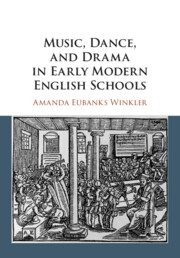‘… an impressive range of primary documents, most previously unknown or unstudied, from schools throughout England, applying scholarly methodologies from musicology, theatre history, and performance studies.’
Linda Phyllis Austern
Source: Music & Letters
‘a significant and seminal book, not only for the contribution it makes to the current scholarly picture, but for the future work that it will surely inspire.’
Simon Smith
Source: Early Theatre Book Review
‘… combines performance studies and phenomenological approaches with a robust engagement with archival sources to explore questions around gender and class in pedagogical performance. Understanding performance as a ‘node through which various cultural energies flowed-spiritual, pedagogical, and recreational,’ Eubanks Winkler analyzes a wide range of sources including personal letters, scores, and playbills to illuminate the social context of early modern musical education. In addition to being a valuable resource for scholars of theater music history, this book will appeal to a broader readership because of its attention to the agency and embodied experience of schoolchildren.’
Dori Coblentz
Source: Renaissance Quarterly
‘Using present-day experiences - as a participant, as a listener and viewer, and as a parent of school-age children - the author is able to nourish and inform the work as a historian, fleshing out the bones of the narrative tentatively reconstructed from textual sources. This book thus offers a skilful model of how to engage with past culture, despite the inevitable challenges posed by lacunae in available sources. The work will be of enormous value to scholars working across a wide spectrum of early modern cultural discourses, including gender identity, social hierarchy, the development of the professions, religious and confessional practices, etc.’
Michael Gale
Source: Journal of Historical Research in Music Education
‘Amanda Eubanks Winkler’s study of pedagogical performance in and relating to early modern English schools is both fascinating and methodologically groundbreaking. On the first page she mentions a wholesome experience of her own, a production of Singing in the Rain she saw through the ‘rosy lens of parental devotion.’ It stands in contrast to the sixteenth-century image displayed on the book’s cover, which features a boy getting thrashed as others sing together and attend, somewhat distractedly, to their lessons. Neither is misleading about this book’s contents. It is a testament to the wide scope of this study that Eubanks Winkler tackles both sides of the equation, paying careful attention to issues surrounding student accomplishments and pedagogical failures.’
Jeremy L. Smith
Source: NABMSA Reviews
‘Eubanks Winkler makes us comfortable with historical gaps and temporal tension. She shows us that it is possible to reconceive and reevaluate some of the most familiar early modern works, and she demonstrates the richness of previously undiscovered sources. Most significantly, perhaps, Eubanks Winkler presents us with a methodology to reanimate the past through the lens of our own experiences.’
Sarah Williams
Source: Journal of Seventeenth-Century Music





